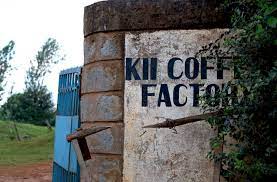
FILTER: KENYA KIRINYAGA KII AA
New Coffee Alert!
The small region in Kirinyaga that the Kii mill serves, surrounding the village of Ngariama, is mainly a tea-growing area, so most of the coffee plant stock is rather new. The region is known for very high quality of both tea and coffee; being planted somewhat later than neighbouring regions means soils haven’t been tired out by years of conventional agriculture, with its sprays and chemical fertiliser. We visited the region in January 2021, witnessing the density of both coffee and tea plantation in the lush green landscape.
North Eastern Kirinyaga is home to some of our favourite Kenyan coffees; Kii is run by the Rungeto Farmer’s Cooperative Society, who also own the Karimikui and Kiangoi mills, where we have purchased several lots in the past. Also near to Ngariama are Gakuyuini, where we have secured a lot for later in the season, and the new Long Miles project, where we have purchased a great deal of coffee this year. Much of the area was planted with coffee just before the rise of hybrid varietals in Kenya, which means that 99% of the farmers that deliver to Kii grow SL28 and SL34, with only about 1% using rust-resistant varietals like Ruiru 11 or Batian.
The Rungeto cooperative’s cherry selection, fermentation, sorting and separation is of incredibly high quality, leading to excellent coffee. The cherries are first depulped mechanically, as soon as they arrive at the factory. The cherries should arrive for depulping as soon as possible after picking, hence why cooperatives make a great effort to have factories located close to concentrations of smallholders. After depulping, the seeds are covered in a layer of sticky fruity pulp, or mucilage. The mucilage is fermented in large tanks for between 12 and 24 hours, breaking it down to a point that it can be thoroughly ‘washed’ from the seeds, using long washing channels. Then, before drying, the cherries are taken to another set of fermentation tanks, and fermented again under water, normally for a shorter time, between 10 and 12 hours.
This ‘double soak’ is popular in Kenya, and is useful not only for enhancing the cleanliness and intensity of the final cup, but also as a second opportunity to sort for lower density floating seeds, as these are often of lower quality, or from unripe cherries. Each lot that is processed is kept separate throughout the process, allowing each to be cupped separately. This allows the management of the mill to assess patterns of quality and continuously improve. There is always a degree of unpredictability however, so cupping continuously is the only way to find the finest lots of the harvest, especially in recent years as hybrid varietals have increased in use, and many mills have increased capacity in an attempt to cash in on record prices for Kenyan coffee.
